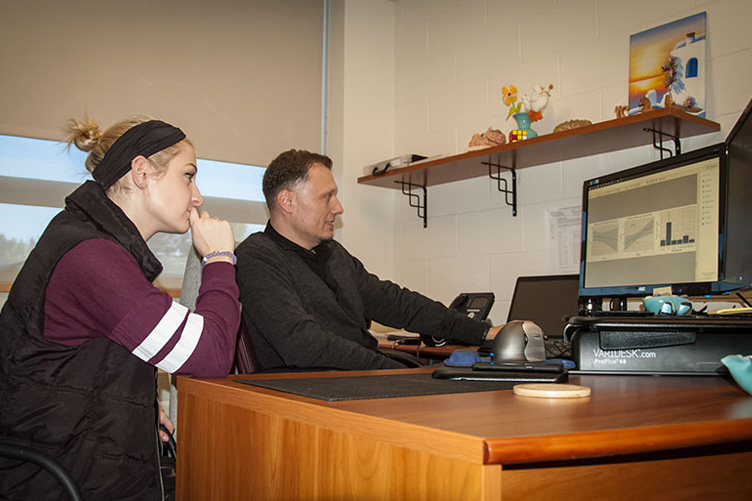
Almost 300 people have died in New Hampshire this year from opioid overdoses, and state officials expect the final number of overdose deaths to reach 488 people by the end of 2016. As the Granite State continues to grapple with the effects of opioid addiction, assistant professor of psychology Sergios Charntikov and a team of student researchers are trying to better understand the factors underlying heroin use and abuse, with an emphasis on how an individual's ability to cope with stress contributes to the problem.
“We’re studying the relationship between stress and heroin abuse, and also trying to understand what makes someone vulnerable or resilient to stress,” Charntikov says. “Our hypothesis is that individuals who are vulnerable to stress will likely be susceptible to substance abuse and specifically to heroin dependence.”
Undergraduates Megan Duranko '17, Erin Hart '18, and Kathryn Taylor '17 work in Charntikov’s lab. Their efforts got a boost earlier this year when the three received Summer Undergraduate Research Fellowships (SURF) through the UNH Hamel Center for Undergraduate Research, which enabled them to continue their work through the summer.
Charntikov is using a pre-clinical animal model to study addiction. Though other studies have found a link between acute stress and heroin use, Charntikov believes there is still much to learn about how an individual’s sensitivity to stress contributes to opioid addiction.

The Problem
Opiates and heroin are the most commonly cited drugs among drug treatment admissions in New Hampshire. Heroin use in the state is rapidly becoming a great concern and financial burden for law enforcement, the incarceration system and health care providers. Users are at greater risk of contracting HIV, hepatitis and infections, and, in general, experience significantly poorer physical and mental health. These health issues in combination with difficulties maintaining reliable employment translate to an inability to care or provide for their children, thus adding costs to the social service system. Importantly, behavioral and physiological effects associated with heroin use can persist for years after drug use is discontinued.
“We are doing the study because we are recognizing the great need for individual treatment approaches based on a person’s individual history with and sensitivity to various stressors. A better understanding of how individual reactivity to stress relates to a propensity for drug use and abuse is critical if the goal is to develop prevention and treatment therapies that have much greater success rates than what is currently available,” he says.
Looking at individual responses to stress is important, according to Charntikov. While stress is a universal experience, every person, and every animal, responds differently. Some are more vulnerable to the effects of stress; others are not. Those behavioral and biological differences can help predict heroin use and abuse.
“In our preliminary study, we show that those who are vulnerable to stress take more of the drug and are willing to work harder to get the drug. That right now is the biggest finding we have that can lead us to a path of designing individualized treatment plans based on individual reactivity to stress,” he says.
The research wouldn’t be possible without Duranko, Hart, and Taylor, as well as other undergraduate researchers who work in the lab every day. “Undergraduates are the critical components of labs like mine,” Charntikov says. “Everything is built on student work.”
For Taylor, it’s a chance to see two sides of the fight against opioid addiction. When she’s not in class or in the research lab, Taylor is an EMT with Durham’s McGregor Memorial EMS. “I believe the first step in fighting the heroin epidemic is to further research and understand the drug and the different effects it has on individuals,” Taylor says. “Research like ours is critical for understanding the drug and developing methods that can prevent it from taking so many lives.”
All three students agree that the hands-on experience in the lab has been valuable for their academic and professional careers. Hart plans to pursue a Ph.D. in neuroscience, and her work in Charntikov’s lab will give her an edge in competitive programs.
“Receiving the SURF grant allowed me to fully dedicate myself to the lab this summer, without having to worry about dividing my time between the lab and a full-time job. Without it, there would have been no way for me to be as involved in this project,” she says.
Along with working in the lab, students also take part in weekly meetings to talk about the data they’ve collected and to look at the theory and science behind the research. Charntikov calls it “team-oriented work.”
Duranko, who also plans to pursue a graduate degree, agrees. “I’m a very hands-on person, and doing something in the lab teaches me better than anything in a lecture,” she says. “We come to the lab each day because we know that it’s important. It’s a small thing on the large scale, but to think we might have any sort of impact on the epidemic, even in a little way, is a nice thing to think about.”
The project has been going on for three months so far, and Charntikov says it will be another three months before the experiment wraps up and findings can be presented. The results could help direct treatment strategies for people with substance abuse disorders, he says, adding that working with undergraduates to pursue those answers helps everyone.
“I’m a firm believer that you want to do something important for the community,” Charntikov says.
-
Written By:
Larry Clow '12G | UNH Cooperative Extension
















































